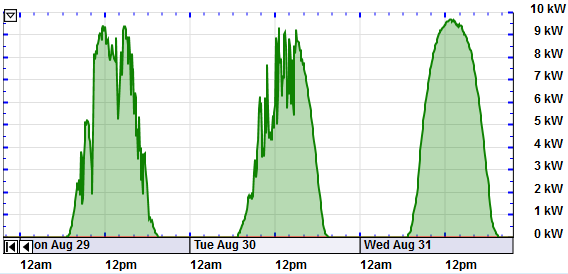
Applied Multivariable Calculus I: The Calculus of Sustainability
Department: Math, Statistics, and Computer Science
First-year Course

Professor Lori Ziegelmeier
Why should I take this class?
- What percentage of the US could be covered by solar panels to produce all of the electricity needs of the US?
- Under optimal conditions, how much power can a wind turbine of a certain radius produce?
- How can the population of wolves in Northern Minnesota be modeled?
We adopt a mathematical framework to better understand sustainability questions. As a student applied mathematician, you’ll come to view mathematics not as a system of formulas to be memorized and manipulated, but as a flexible and powerful toolbox of ideas that can help solve real problems in diverse disciplinary fields including environmental science, biology, economics, geoscience, physics, chemistry, medicine, and more.

An example of some data we will study.
Markim Hall’s solar energy output from the start of the Fall 2018 semester:
Prerequisites: Basic high school math (through algebra and trigonometry) is required. But even if you have extensive experience with calculus (including advanced placement or similar) you may find new and challenging material in this course because of its emphasis on applications, modeling, computation, and multivariate models.
Selected texts:
Applied Calculus, 5th edition by Hughes-Hallet, et al
Start R in Calculus by Daniel Kaplan
Pro tip: Think and act like a scientist: Ask questions relentlessly until you understand.
September 15 2020
Back to top




